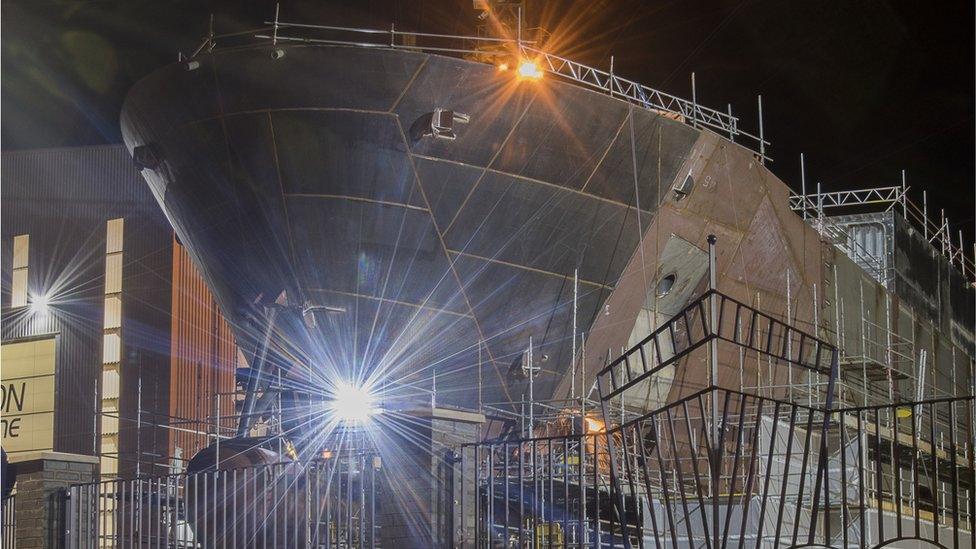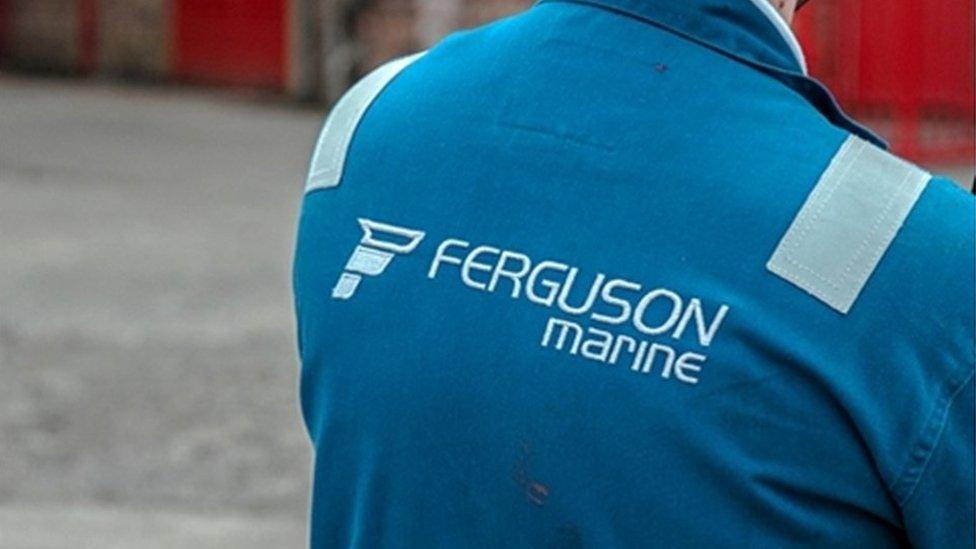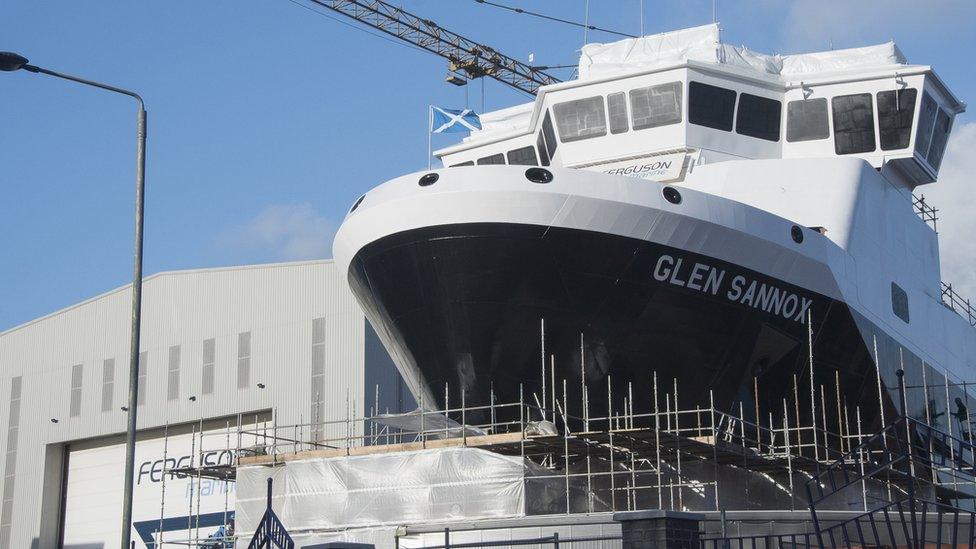Launching into uncharted waters
- Published

Work on Glen Sannox has fallen way behind schedule
Ferguson Marine Engineering looks very likely to become a government-owned shipyard.
It raises questions about industrial strategy, if another company is to be run by the state, after repeated failures.
What will Scottish ministers do with the shipyard, where industrial tycoon Jim McColl failed? And what opportunities will be lost if his management team is leaving?
Like a ship at its launch, gathering momentum as it descends the slipway, there's not much that can stop Ferguson Marine Engineering Ltd from plunging into the uncertain waters of government ownership.
Happily, it is unlike yards on the narrower upper Clyde in that launches do not carry the risk of getting a severe dunt on the opposite bank. But there's a lot about these waters that is uncharted.
By the end of next week, it seems likely that the financial risk for the shipyard will be on government books, and no longer those of industrialist Jim McColl.
The Scottish government's agency, Caledonian Maritime Assets Ltd (CMAL), is understood already to have paid almost all the £97m fixed price for the two CalMac ferries at the heart of the Ferguson's dispute, and long before their completion.
If the future is to be nationalised, it will have to pay for the remaining work to get the Glen Sannox and 'hull number 802' into service on the Brodick-Ardrossan route and between Lochmaddy, Uig and Tarbert.
State strategy
CMAL has been blamed by Ferguson for making so many changes to the design - particularly of the special requirements for the prototype diesel/liquified natural gas engine - that the cost is now reckoned to have doubled.
Jim McColl had offered to meet the Scottish government roughly half way on the overspend - asking for about £40m. A statement from his company says it consistently refused to engage.
The Scottish government argues, first, that to bail McColl's company out of a fixed price contract would bring legal claims by other bidders, and second, that to fund the overspend would break European state aid rules.

Jim McColl had sought a compromise deal with the government
So if it wasn't willing to meet some of Ferguson's extra costs: it is determined to finish the ferries and keep the yard open, thus protecting jobs: it has £45m in loans outstanding, which have long puzzled opposition MSPs: then state ownership becomes the inevitable consequence.
That raises big questions about industrial strategy. The SNP administration has been willing to take a stake in BiFab fabrication yards, though their prospects for sustainable orders, and building up to scale of offshore wind farm work, do not look good.
Having taken over Prestwick Airport, it is subsidising operations there with up to £10m per year (while declaring a climate emergency). And it has taken over Scotland's once world-leading wave power firms in the hope that their technology will one day find a market.
So is this the state backing new technologies? Or preserving older industries, with the jobs attached, in the belief that state ownership can succeed where Scotland's most successful living engineering entrepreneur could not?
Fair value
Mr McColl will be licking his financial and reputational wounds. It is understood that he sank around £28m in Ferguson Marine, having arrived with a huge fanfare in the closing stages of the independence referendum. As one of the economic advisers to the Scottish government, he'll be wondering if he wants to get that close again.
The extent of damage to his investment vessel, Clyde Blowers Capital, depends on whether he gets compensation and "fair value", or merely the £1 for which the yard could potentially be transferred.
The plans his management team had worked up, to attract a wide variety of other marine engineering work to the yard, will likely be set back. One of them is a big chunk of the work on the next generation of Royal Navy frigates, in a consortium including Babcock in Rosyth.

Some potential work at Port Glasgow may already have been lost
Now it's merely my hunch, but might the sales force see more of a career future with international business investor Jim McColl than with economy minister Derek Mackay?
I'm told that some potential clients wanting to place work at the Port Glasgow yard have been delayed by the CalMac ferries dispute. At least one contract has gone to the Netherlands, without Ferguson having the capacity at present to bid.
Plans to take over an enormous dry dock, also in Inverclyde, will require government capital, if it is to be the owner, and if Clydeport's owner, Peel Ports, is willing to sell.
Rising cost
Instead of further diversifying, government ownership will likely focus on securing jobs in a yard which looks well placed to reduce the backlog of CalMac ferries by servicing a regular drumbeat of orders.
But constrained by Scottish government capital funds, that is thought unlikely to sustain the 350-strong workforce currently there, or to grow it beyond 600, which Jim McColl had targeted.
It's also questionable whether a state-owned yard can assume that government contracts will inevitably fall to it. In or out of the European Union, some state aid rules are surely likely to apply.
Some form of competitive bidding is widely seen as the best way of ensuring value for public procurement pounds. Removing that element is an invitation to run the contracts inefficiently, and to the fiat of ministers.
In any case, it's not clear that anyone in the Scottish government or CMAL knows what went so badly wrong with the current contract that the cost is coming in at double the price. (And who is to say it won't continue to rise?)
It should surely be a high priority that someone figures that out soon.
- Published9 August 2019

